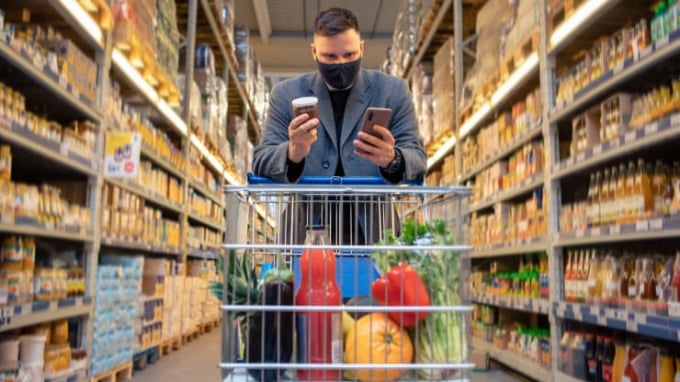May 19, 2025 | 21:07 GMT +7
May 19, 2025 | 21:07 GMT +7
Hotline: 0913.378.918
May 19, 2025 | 21:07 GMT +7
Hotline: 0913.378.918

Meal planning definitely reduces costs. Photo: iStock
That’s because food prices are rising steeply, with the latest data from the U.S. Bureau of Labor Statistics showing a 7.4% increase between January 2021 and January 2022. The cost of bacon has swelled by 18%, and peanut butter, 15%.
It’s unclear when the uptick will relent. In the meantime, experts weighed in on strategies to help you save at the supermarket.
Your kitchen should be stocked with certain essential foods, including eggs, pasta, rice, bread, canned tomatoes, frozen vegetables and fruit, onions and potatoes, said Leanne Brown, author of Good Enough, a self-care cookbook.
Many meals can be made with these ingredients alone, and they serve as the foundation for countless more, meaning you won’t have to buy as many new items each week.
If you have the space, experts say, consider buying these products in large quantities to cut costs even more.
Don’t show up to the supermarket without a grocery list and some ideas of what you’ll be cooking for the week, Brown said.
“Meal planning definitely reduces costs,” she said. “If you stick to it, you don’t waste food that you bought without a plan.”
While you map out your dishes for the week, try to think of recipes that are easily repurposed, she added. For example, a pot of chili can later be used to fill burritos or as nacho toppings.
You can decide eating certain foods on repeat is sad or monotonous or — like so much else with life — you can choose to look at it more positively.
“Having the same breakfast every day for a week can be really comforting and simplify things both wallet-wise and decision-making wise,” Brown said. “Then you can do something else the next week, so you don’t feel bored.”
Your grocery list probably won’t prevent all your impulse buys, but that doesn’t mean you shouldn’t use one.
“Even if you stick to them somewhat, that is great,” Brown said. “We don’t need to worry about perfection.”
As a treat, she purposefully plans to buy one or two things off her list.
You can usually browse discounts on a supermarket’s website or app, or find them listed at the retailer, experts say.
Take a look at your grocery list before you decide where to do your buying, said Erin Clarke, author of The Well Plated Cookbook. Then, try to find the store that offers the best value on the particular items you’re looking for.
“If you’re doing a produce-heavy trip, look for a store with frequent produce sales,” Clarke said. “If you’re stocking up on shelf-stable goods, choose a store that has the best value for those, even if other items, like produce, cost more.”
Billy Vasquez, who runs The 99 Cent Chef blog, said he picks up many of his non-perishable items, including mayonnaise, ketchup, mustard, hot sauce, dried pasta, beans and tortilla chips, at his local dollar store.
Around St. Patrick’s Day, Memorial Day and Independence Day, you can find steep discounts on items like corned beef, carrots, cabbage, turkey, duck, roasts, ham, boxed stuffing, hamburgers and hot dogs, many of which can be stored in the freezer for long periods, Vasquez said.
Meanwhile, generic and store-brands tend to be the cheaper varieties, Brown said, adding that, “buying more canned and frozen vegetables when many aren’t in season is another evergreen choice.”
Meat and dairy tend to be the more expensive items at the supermarket, and especially of late. In response, aim to make more meals that don’t rely on them as the central ingredient, Brown said.
“Using meat sparingly as flavor, like adding a bit of bacon to a mushroom risotto, is more economical,” she said. Consuming less meat also helps you to lower your environmental footprint, she added.
Buying foods with a longer shelf life can cut your trips to the supermarket all together. “Cabbage, carrots, brussels sprouts and beets can last for two weeks or longer when stored in the crisper drawer,” Clarke said.
Delaying your return is always good for your wallet, she said.
“Every time you walk into the store, that’s an opportunity for impulse purchases to drive up the bill,” she said.
(CNBC)

(VAN) Fourth most important food crop in peril as Latin America and Caribbean suffer from slow-onset climate disaster.

(VAN) Shifting market dynamics and the noise around new legislation has propelled Trouw Nutrition’s research around early life nutrition in poultry. Today, it continues to be a key area of research.

(VAN) India is concerned about its food security and the livelihoods of its farmers if more US food imports are allowed.

(VAN) FAO's Director-General emphasises the need to work together to transform agrifood systems.

(VAN) Europe is facing its worst outbreak of foot-and-mouth since the start of the century.

(VAN) The central authorities, in early April, released a 10-year plan for rural vitalization.

(VAN) Viterra marked a significant milestone in its carbon measurement program in Argentina, called Ígaris, reaching 1 million soybean hectares measured.